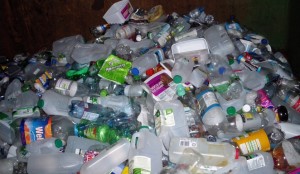Source: treehugger.com
 Published: August 25, 2014
Published: August 25, 2014
CC BY-NC-SA 2.0 marc e marc
Plastics are everywhere and for each different application, there is a different type of polymer that suits those needs. Most plastics can be recycled, but first they must be sorted by type which is done by hand at waste processing facilities and is time-consuming.
A new technology developed by researchers at Ludwig Maximilians Universitat in Munich aims to speed up that process and make plastic sorting more efficient so that more plastics can be recycled into new things.
In the system, plastic items are exposed to a flash of light which causes them to fluoresce. Photoelectric sensors then measure the fluorescence lifetimes — how long it takes for that fluorescence to fade. Different types of plastic polymers have different fluorescence lifetimes, so that measurement is able to accurately identify specific plastics.
“With this process, errors in measurement are practically ruled out; for any given material, one will always obtain the same value for the fluorescence half-life, just as in the case of radioactive decay,” said project leader, Prof. Heinz Langhals.
In testing, the technology has been able to sort up to 1.5 tons of plastic per hour, which already meets the specifications needed for it to be used on an industrial scale. This process could not only speed up the recycling process, but having a way to more accurately sort the plastics means that more things can actually be made from them. Many items can only be made from pure forms of certain plastics. This technology could guarantee that the types are separated for future use.
